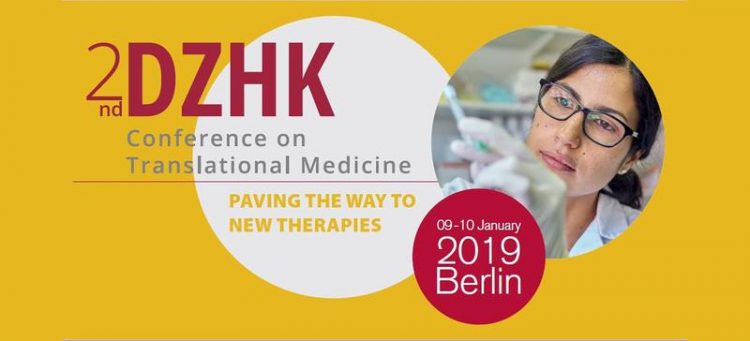Conference to pave the way for new therapies

2nd DZHK Conference on Translational Medicine DZHK
Scientists and healthcare professionals all over the world ask themselves this question as diseases like dementia, cardiovascular diseases and cancer continue to pose an increasingly significant challenge in our ever-ageing society.
Translation is the process of bringing new research into routine medical practice, but this usually happens too rarely and too slowly. The demands on modern medicine have also changed as we improve treatments and strive to offer personalised medicine. Big data and artificial intelligence are now finding their way into all areas of research and health care.
To further complicate matters, the painstaking process of bringing research to true patient benefit can involve collaborations across different disciplines and sectors – between researchers and doctors, computational scientists and industry leaders, and even regulatory authorities, health services and many more.
“There is no sure formula for successful translation, but we are all learning from each other” says DZHK Board Chairman Thomas Eschenhagen. The conference will cover not only cardiovascular research but also showcase examples of successful translation from other disease areas.
Michaela Sharpe from the Catapult Programme in London will report on how they have built a network that encourages UK businesses, scientists and engineers to work together, to bring medical innovation onto the market.
The Mainz-based researcher and biotech entrepreneur Ugur Sahin will speak about his new cancer therapy, which is the result of years of research and development, showing promise in treating melanoma. The therapy reprogrammes a patient’s immune cells to recognise the individual characteristics of cancer cells and destroy them. Researchers and authorities are breaking new ground when it comes to the authorisation of such personalised medicine, where conventional clinical trials are not suitable.
“Successes, like those of Ugur Sahin, encourage us translational researchers and show that it is worth thinking in new ways” states Eschenhagen. Yet for him, it is also important to convey a realistic picture to early career researchers. According to him, translation is not synonymous with quick success.
Instead, having a lot of staying power and a strong network is required. The DZHK is one of six German Centres for Health Research (DZG), the founding of which was initiated by the German Federal Government. Each of the centres unites experts on a widespread disease from all over Germany with the aim of accelerating translation.
Pierluigi Nicotera, Scientific Director of the German Center for Neurodegenerative Diseases (DZNE), will show how a new computer system – so-called Memory-Driven Computing – will contribute to new findings in the area of genome research and image analysis, with particular emphasis on neurodegenerative diseases.
In the area of cardiovascular research, DZHK researchers have made major progress in the last three years with artificial heart tissue grown from stem cells. Tissues of this kind are required because damaged heart cells cannot repair themselves after a heart attack. At the conference, projects will be introduced that are preparing their first trials in humans.
“The basis for successful translation is still good science”, says Eschenhagen with conviction. According to him, translation needs both strong basic research and programmes that purposefully transfer the results of this research into application.
2nd DZHK Conference on Translational Medicine
9th to 10th January 2019, Berlin, Langenbeck-Virchow-Haus
Programme and registration:
https://conference2019.dzhk.de
The official language of the conference is English.
Media Contact
All latest news from the category: Event News
Newest articles

Parallel Paths: Understanding Malaria Resistance in Chimpanzees and Humans
The closest relatives of humans adapt genetically to habitats and infections Survival of the Fittest: Genetic Adaptations Uncovered in Chimpanzees Görlitz, 10.01.2025. Chimpanzees have genetic adaptations that help them survive…

You are What You Eat—Stanford Study Links Fiber to Anti-Cancer Gene Modulation
The Fiber Gap: A Growing Concern in American Diets Fiber is well known to be an important part of a healthy diet, yet less than 10% of Americans eat the minimum recommended…

Trust Your Gut—RNA-Protein Discovery for Better Immunity
HIRI researchers uncover control mechanisms of polysaccharide utilization in Bacteroides thetaiotaomicron. Researchers at the Helmholtz Institute for RNA-based Infection Research (HIRI) and the Julius-Maximilians-Universität (JMU) in Würzburg have identified a…



